
by Fiona Moore
I was interested in reading this month’s Ace Double because I’d never read any Rackham, but had heard some good things about his writing. Ipomoea turned out to be a mixed bag, a pacy adventure story with some interesting themes that didn’t quite live up to its early promise.
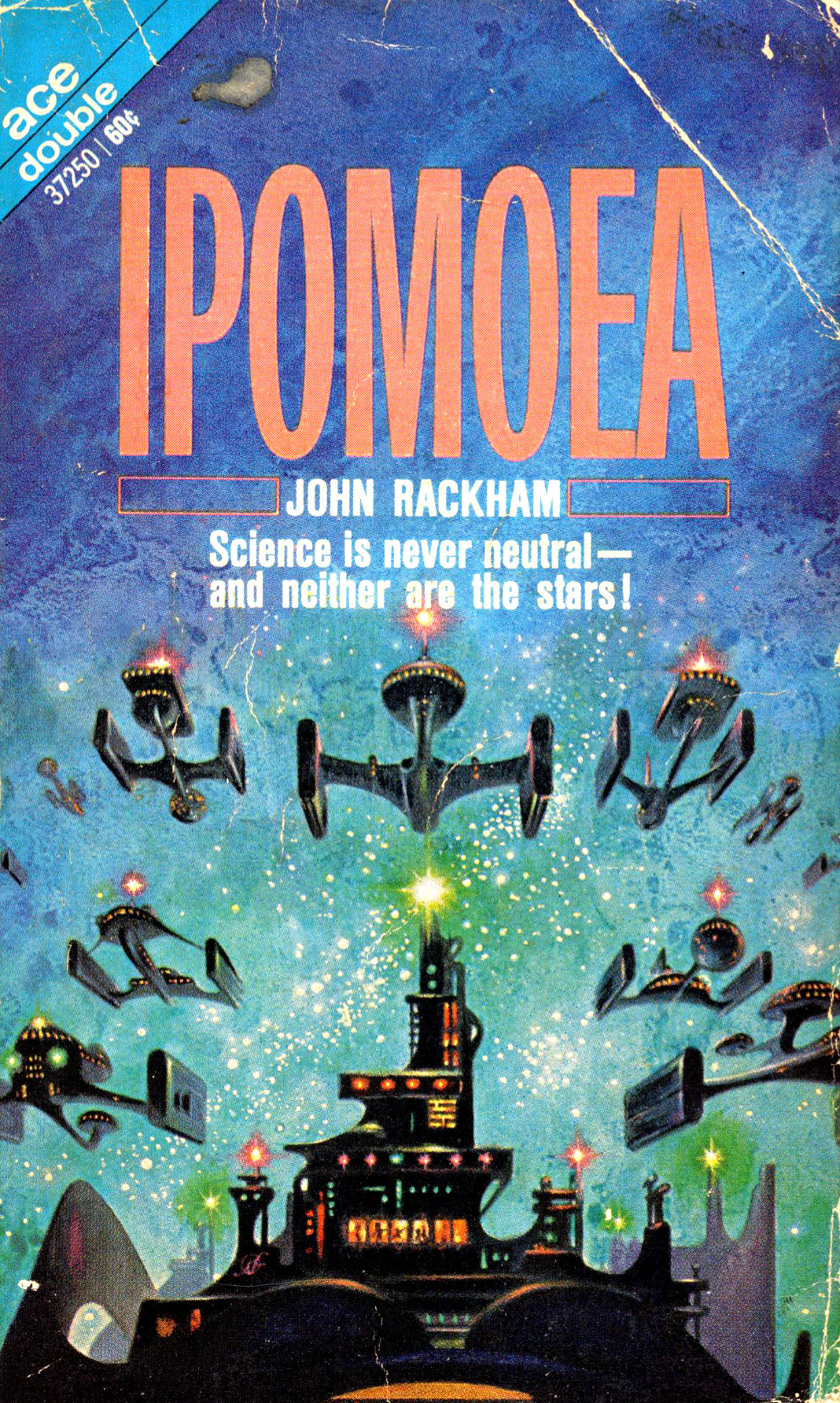
Cover of Ipomoea
The story takes place in a future society where interplanetary travel is as easy as taking an ocean liner is now, and a small number of people are making it rich on a trio of exoplanets which are within easy reach of Earth’s solar system. Our protagonist, Sam Hutten, is the son of one of those exoplanetary billionaires, but he has rejected his father and is now working as a sociologist on Earth. He receives, and obeys, a request to visit his father but clearly the request is more than social: assassination attempts, and contact with mysterious government agents investigating a new super-addictive drug going by the name of “Happy Sugar” (and derived from plants of the Ipomoea genus, hence the title), are to follow. When Hutten’s father turns up dead, Hutten investigates and finds a plot for universal domination by another of the billionaires, involving the drug and some gems capable of mentally conditioning their wearer.
There’s some very good and timely ideas here. The drug plot clearly draws on anxieties in the news about the possibility that the “tune in, turn on, drop out” culture of today might make people susceptible to influence by Communists or worse. There are also some good SFnal touches of imagined technology, with humanoid robots and a character who has, Frankenstein-like, been formed through melding three different people (meaning he lacks an ego and is therefore conveniently immune to psionic suggestion).
However, what I found most intriguing about the novella was the initial setup of a world where Japan has become the dominant economic and cultural power. Rackham’s argument is that the Japanese will come to this position through their production of cheap goods at low prices: “They made their stuff cheap not in competition, not to undercut anyone else, but because it could be made cheap.” Through pursuing excellence for its own sake, rather than in pursuit of conquest, they become top nation. While I’m not thoroughly convinced at the idea that the Japanese are non-competitive, the country’s recent technological and economic progress suggests that a Japanese-dominated twenty-first century might not be an outside possibility. This idea that success is achieved through non-competition and selflessness becomes a thematic link through the book, in that the villain enslaves his victims psionically through appealing to their subconscious desires, and it is only through sublimating the ego that one can resist.
Unfortunately, a lot of this early setup goes by the wayside. Apart from a few brief scenes, we don’t actually get much sense that this world is Japanese-influenced. Although this might be excused on the grounds that the villains, on the exoplanet, appear to be Europeans and into the idea of racial purity, one would expect a bit more comment on the distinction between their worlds and Earth from our protagonist.
Furthermore, we never get much exploration of why Hutten became estranged from his family, or why he became a sociologist beyond that this allows him long passages of exposition on the nature of society. Indeed, by about three-quarters of the way in Hutten’s profession appears to have been forgotten, as the story takes a sharp twist into James Bond territory. Hutten and his special agent friends must bring down a villain who is depressingly keen on making speeches explaining his plans for universal domination, and the resolution is telegraphed rather obviously to the reader.
It’s even more disappointing since, early in the story, Hutten argues, based on the rise of the Japanese, that “world domination will not work, either through force or persuasion… No government can long persist against the will of the governed,” which suggests that, if that theme were pursued, the villain would be defeated through collective action on the part of the people. Instead, we get superheroes with convenient powers saving the day, without any challenge to the economic status quo that, for all Hutten’s speechifying about the Japanese values of doing well by doing good simply for its own sake, has allowed eight billionaires to dominate its economy. A more self-aware novella might have made something of the cognitive dissonance between Hutten’s theories and the fact that the world he’s in doesn’t work that way at all (to say nothing of Hutten’s complete obliviousness of this problem), but not this one.
Two and a half stars, mostly for the setup.
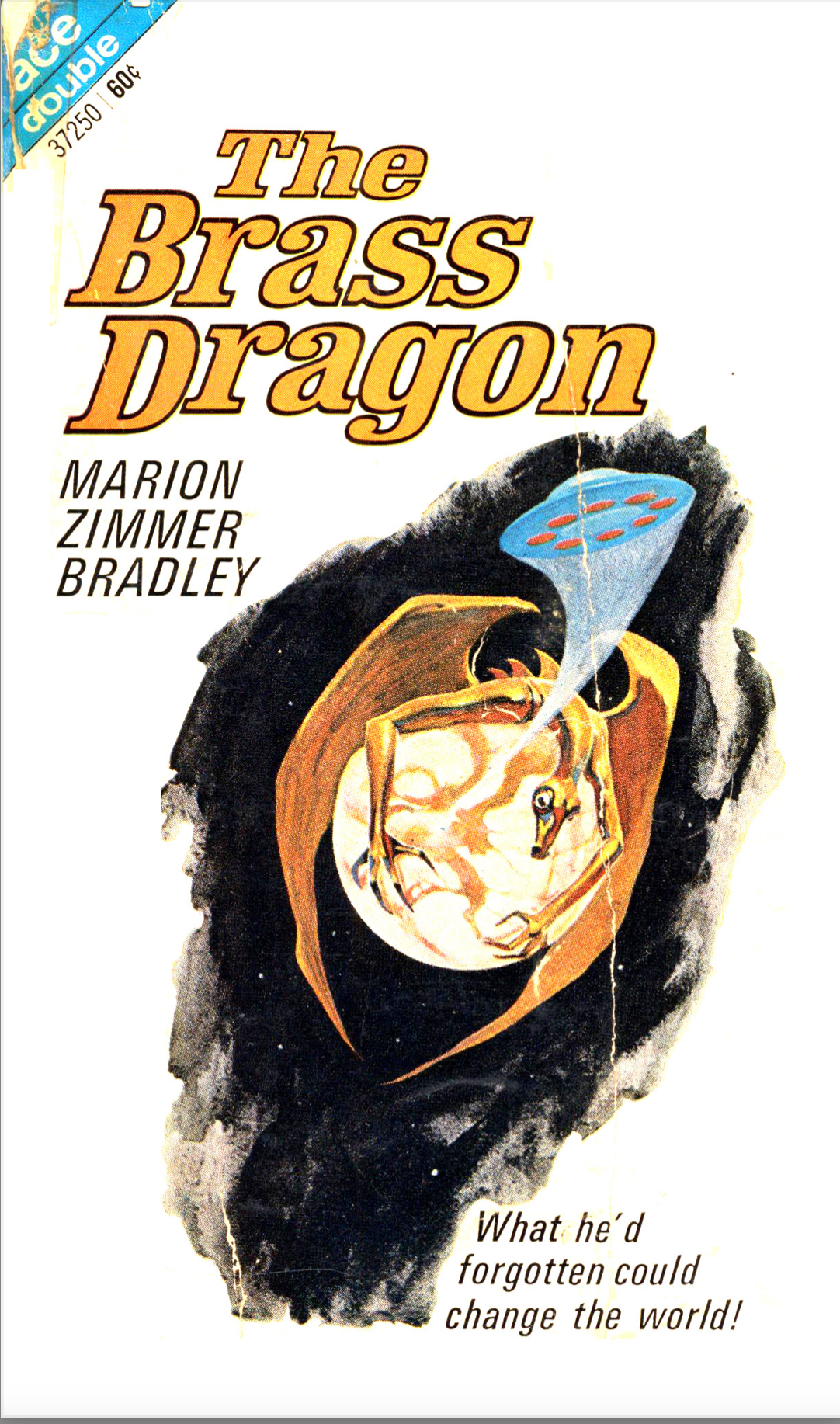
Cover of The Brass Dragon
I won’t say too much about the second half of the double, The Brass Dragon by Marion Zimmer Bradley. It’s an oddly good fit with the Rackham but for the wrong reasons, namely that it also sets up an intriguing mystery only for the revelation to prove rather disappointing.
The story revolves around Barry Cowan, a young man who turns up in a Texas hospital with no memory of his past life other than a vague impression that he used to live in California, a few disconnected memories of some place that may or may not be Earth, and a little brass statue of a dragon in his pocket. The mystery builds as he is found by his (very normal) family and returned home, but is stalked by strange people apparently looking for something in his possession, and who threaten him and his family. Is he a time-traveler? An arrival from a parallel universe? An alien in human form?
About halfway through the narrative, his memory is restored, and everything falls into place for himself and for the reader. In case anyone here is planning on reading this, I won’t reveal too much other than to say that it becomes a fairly straightforward, even banal, space adventure. I’m also not quite sure who the intended audience is: the age of the protagonist (eighteen) suggests it’s supposed to be a juvenile, but there’s no real reason why he couldn’t be an adult.
Two stars, again mostly for the buildup.

By Mx Kris Vyas-Myall
Six Gates from Limbo, by J.T. McIntosh: A Comparison
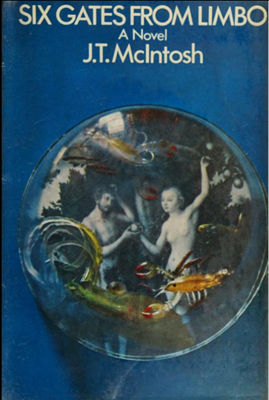
Cover Design by Colin Andrews
A funny thing happened to me on the way to my magazines recently. I had already read my copy of Six Gates From Limbo, from Michael Joseph when I saw it was being serialized in If. I delayed my reading of these issues but I did look at my colleague David’s reviews of them. This is when a few odd things occurred to me.
Firstly, it took place over two issues which also contained many other stories, yet my issues of If were not particularly thick to make up for this. In addition, I noticed David’s reviews stated how rushed the story seemed, when no such point had occurred to me.
Now I know magazines do cut down stories, but this had no explanation as this was essentially a novella version. When New Worlds is forced to cut down, they have given summaries of what has been excised and have been the subject of attacks in fanzines for losing parts of the original content. I have not yet seen anyone had comment on this in the case of If.
So, in the obsessive way I like to do things, I performed a chapter-by-chapter wordcount comparison to see what was lost. By my estimation, the serialized form constitutes only around 40% of the novel length!

This is not as much of a change between the novelette and novel versions of Flowers For Algernon but not dissimilar to the different versions of Drowned World. As such I thought some in-depth investigating was in order.
To start with, where have the changes been made? The answer is, throughout. The only chapter which appeared to be in-tact is the final one. This makes some sense as the final discussion between Rex and Regina is necessary to accentuate the themes. In addition, it is the shortest so there is less to remove.

The only other without much cut from it is the next shortest chapter, Rex’s return to Limbo from Mercury. From the rest, all have between 40 and 80% of their content removed.
As such, the central plot remains predominantly the same. Three people awake in an idyllic artificial environment with six portals to other planets. They investigate through them but find each flawed in some way. They have to work out what has happened and what they will do about it.
What changes between the novel and magazine versions are the details and emphasis. To take the “return to Limbo” chapter that I mentioned before, the start provides a good example of what is often removed:
Here are the first few paragraphs in its serialized form:
His awakening in Limbo was the worst of the three he had experienced, but there was one good thing about it. Regina was there. She was crying. Vaguely he gathered he’d been gone seventeen days.
Tiny as she was, she had virtually carried him home and left him in the bathroom.
An hour later, desperately tired and weak, but clean, he managed to stagger to bed. He was surprised and hurt that Regina wasn’t anywhere upstairs.
Then through his fatigue he sniffed and found enough energy to get out of bed again. Regina was cooking grilled steak…
He went down in his pajamas. When he arrived, Regina was pouring the wine.
And in the book form:
Regina got him back to the house with some difficulty. She was crying – vaguely he gathered he’d been gone seventeen days. In Limbo it was night. She had rushed to the Gateway in her nightdress the moment she sensed his return.
This awakening was the worst of the three because he had no sleep and little food on Mercury. Only some twelve hours after the ordeal of transference, it had been repeated. The thirst was familiar, and the hunger, but this time there was also a desperate lassitude and weakness that put talking out of the question, other than the occasional gasped word.
Again he had his memory unimpaired and he wanted to restore himself the way that seemed natural to him, by crawling in the bushes, chewing fruit, drinking clear water and bathing in the lake. But the lake, Regina reminded him, was seven miles away, and the house less than one mile.
Tiny as she was, she had virtually carried him home and left him in the bathroom.
An hour later, desperately tired and weak, but clean, he managed to stagger to bed. He was surprised and hurt that Regina wasn’t anywhere upstairs.
Then through his fatigue he sniffed and found enough energy to get out of bed again. Regina was cooking grilled steak…It couldn’t be fresh killed meat, because Regina on her own would certainly not have killed a cow or a bull but it smelled far fresher than anything he had smelled in Mercury.
He went down in his pyjamas. When he arrived, Regina was pouring the wine.
As you can see the facts given are largely the same, but the serialized form lacks any reasoning or flavour. You do not need to know that Rex welcomes the return to the naturalness of life in Limbo compared to the artificiality of Mercury via his thoughts on food as a restorative, but it highlights the themes and makes him a more fleshed-out character.
But are there more substantive changes? Limbo is much more thoroughly explored in the novel, with details of the flora and fauna greatly expanded, along with the nature of their maintenance. With this it is also made explicit the parallels with Adam and Eve, with Regina believing the gateways are the serpent, along with many references to Greek mythology.
Another key element is that the magazine does not contain Rex’s vivid dreams. I can see that they could seem superfluous but I would argue they are, in fact, important for understanding the ending.
I do feel the book length version is more likely to appeal to the hippy crowd, with its rejection of society and the ecological themes.
As David noted, many of the planets get short shrift in the magazine version and that is definitely a notable difference. In addition to much more detail and complexity applied to the transfers, the six gateway worlds are expanded, even Mercury which had the longest section in the magazine. Along with the aforementioned discussions on the artificiality of food, there are also mentions of isolation, suicide kiosks, people overdosing on Pex and other such features of the city.
Possibly the most frustrating excision is almost an entire chapter laying the groundwork about the people on Cresta, why they are central to the final plan and then subsequent sections on what happened as a result. It is instead reduced to Rex making the gateway switch and saying he told someone on the planet about it. Which, even with the final chapter intact, likely makes it confusing for most readers.
So, would my opinion be that the book version is better? Unfortunately not, for there is another element that was expunged by Pohl and it is one I wish McIntosh had not included in his novel: the poor treatment of Regina. (Those of a sensitive disposition may be advised to skip the rest of this section).
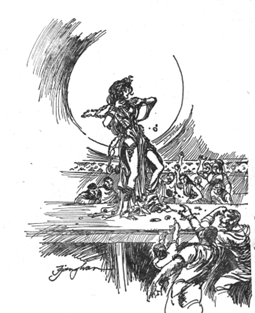
Regina in sexual slavery on Landfall. Not linked to her womanhood in magazine form.
McIntosh’s restrained descriptions of Regina in the serial brought praise from David. Unfortunately, this is definitely not the case in its book form. There Rex sees her as a “girl”, a young nineteen to his twenty-five, with regular descriptions of how pert her breasts are and “child-like” her body is. This is until she is almost raped and turned into a sex slave on Landfall. It is only at that point he can see her as a woman.
Unfortunately, this isn’t even the first rape scene. After his return from Mercury, Rex attempts to rape Regina declaring:
I waited, remember? But after a man and woman are wed, with or without ceremony, after they made love, he can’t rape her. You’re mine, Regina.
Mr. McIntosh is certainly not a devotee of Betty Friedan or Simone de Beauvoir.
If you want my judgement each version succeeds and fails in different ways. Somewhere there is a full length-version which removes the questionable details but continues to expand on the more interesting themes and ideas McIntosh draws out.
Two Stars for both variations

by Brian Collins
Both of the novels I got for this month did not work out, sadly; but interestingly they're failures of different breeds, or rather they fail in different ways. I've read much of what Anne McCaffrey has written over the past few years while this is my first time reading Kenneth Bulmer. Both are pretty close in age, indeed being of the literary generation that preceded the New Wave. How have they adapted—or more importantly, how have they not?
Decision at Doona, by Anne McCaffrey
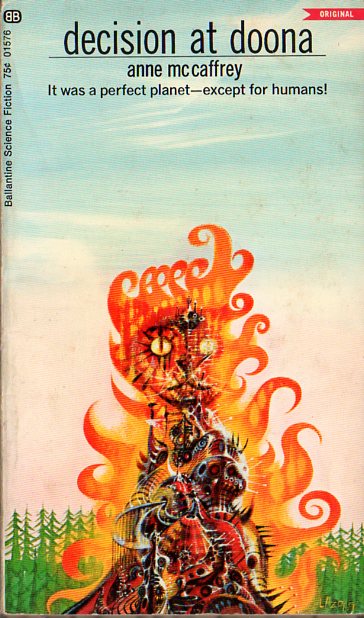
Cover art by Richard Powers.
Anne McCaffrey technically debuted over fifteen years ago, though she has only been writing consistently for the past few years. In those few years she has built quite the following. She became the first woman to win a Hugo in any of the fiction categories, and her Pern and "The Ship Who…" stories have undoubtedly been popular. I'm not a fan.
Decision at Doona is a new standalone novel from McCaffrey, with a premise that will sound familiar for those who remember the Good Old Days of science fiction—the early '50s, incidentally when McCaffrey sold her first story. It's the future, and humanity is scouting for habitable planets, mainly because there's no room left on Earth. Humans live in alcoves, like bees, and have basically depleted the planet's resources. Finding a planet fit for human colonization would already be difficult, but there's an extra criterion: the planet must be devoid of intelligent life comparable to mankind. Doona at first seems like the perfect candidate—until it isn't. The Hrrubans, a race of cat-like aliens, already live on Doona, keeping their existence secret from the first human scouts. The Hrrubans are about as "civilized" as the humans, but that's not going to help either party, as mankind finds itself at an impasse.
So, a first-contact narrative in which, by sheer coincidence, two advanced races meet on a planet which doesn't strictly belong to either of them. The humans are haunted by the collective memory of having encountered another intelligent race before, the Siwannese, which ended tragically. I will say, how the Siwannese became extinct is not what you would expect if you're familiar with colonialism in the Americas. Then again, I'm not sure McCaffrey did much research with regards to real-world colonialism. To give McCaffrey some credit she does delve into the subject, which is an inherently thorny one, with characters even referring to Christopher Columbus with some shame. The central question of the novel, though, that of whether the Hrrubans are indigenous to Doona (if they are then the humans must pull out, and if not then there's room for cooperation), is an odd one that assumes would-be colonizers have the best intentions with a would-be indigenous population.
The strangely tone-deaf optimism and belief in colonizers as basically good people (as opposed to people actively perpetuating a system of death and imprisonment) is a tune that will sound familiar to Analog subscribers. Indeed it's here where I think McCaffrey's key to success lies. While I'm not personally fond of McCaffrey's writing, it's not hard to see why she has become so popular in the past few years. Reading her must be a comfort for a lot of people. After all, in McCaffrey's world it's 1959 and not 1969. Ike is still in office, and Jack Kennedy is a strapping young senator—and alive. Vietnam is a country without any acreage in the minds of suburban Americans. Unfortunately Jack Kennedy is dead and so are we, in some metaphysical sense. We have cast the runes against our own souls. But for McCaffrey, and indeed for the humans within this novel, nothing much has changed since 1959. The distant future will not be too different from how it was in the Good Old Days. Now isn't that a comforting thought?
To make matters more worrying, McCaffrey is just not a very good writer. Even comparing her to some other conservatives (and I do believe McCaffrey is a conservative) in the field, like Poul Anderson and Larry Niven, her worlds and aliens are not as vibrant. Anderson, whose politics are very different from mine, can still be interesting because of his moodiness and at times surprising moral complexity, whereas McCaffrey might be living under a rock. The Hrrubans reminded me somewhat of Niven's Kzinti, but whereas the Kzinti can be easily distinguished from spacefaring humans, McCaffrey's aliens are more analogous to American indigenous peoples. And Doona itself is such a boring location, with barely any thought or writing given to description and mechanics. Surely we deserve better than this.
Two stars.
The Ulcer Culture, by Kenneth Bulmer

Cover artist not credited.
I got mailed this new Bulmer, a British import, because Kris Vyas-Myall is a Bulmer fan and I've not read any of his work before. This may have been a bad idea for a starting point. Firstly, what the hell is this cover? Who is responsible? The artist is uncredited so I'm actually not sure. The novel itself is evidently an attempt on Bulmer's part to get hip with the kids, so to speak. The Ulcer Culture is a dystopian SF novel all about drugs (especially drugs), sex, and violence; and yet I was still bored for much of it.
The plot doesn't really exist, and anyway it would be hard to summarize. The world of the novel is more the point, ya know. It's the future, in what I have to think is fish-and-chips merry goddamn England, and it's "the Age of Material Plenty." There are two groups of people, the Uppers (haha) and the workers, with the former keeping the latter in check with a hallucinogen called Joy Juice. The welfare state has gotten out of hand, with workers lounging around experiencing lifelike hallucinations, having a far-out time as it were. The real problem starts when, for no apparent reason, these hallucinations which normally would provide fantasies for the workers start turning nightmarish. Is the drug supply going bad? Are people's bodies adapting to the drug and having adverse effects? Who really killed Jack Kennedy? Why am I asking you?
Now, science fiction has had a storied history with drugs. When Aldous Huxley wrote Brave New World almost forty years ago, he theorized that drugs could be used to pacify the proletariat and reinforce subservience, through a Freudian understanding of pleasure. Baby wants nipple, baby cries until he gets nipple, baby acquires nipple, baby stops crying. Huxley would later change his mind profoundly on the subject of drug use, although it seems Bulmer has not gotten the memo. The problem for the reader is that The Ulcer Culture reads like a middle-aged conservative's attempt at trying to understand the hedonistic antics of the younger generation. This is a "New Wave" novel, but within limits. Sexuality plays a major role, yet women only appear in the margins and to a symbolic capacity; and despite the lack of female interest there's no mention of homosexuality. I thought the British were all about buggering each other. Is that the word? And there's basically no swearing either—no "cock," no "pussy," not even a token "fuck" thrown in as a treat.
At first I was led to believe Bulmer knew what he was doing, but then I realized he's merely puppeteering the corpse of some nonexistent New Wave writer with this outing—which, mind you, is a failure in writing that was not due to laziness or cowardice. I don't like it, but I at least respect the effort.
Two stars.

by Cora Buhlert
Conan with a Metafictional Gimmick: Kothar, Barbarian Swordsman, by Gardner F. Fox

There has been an invasion at my trusty local import bookstore, an invasion of scantily clad, muscular Barbarians, sporting furry loincloths and horned helmets and brandishing gigantic swords and axes, while equally scantily clad maidens cling to their mighty thews.
The genre that Fritz Leiber dubbed "swords and sorcery" was born forty years ago almost to the day, when Robert E. Howard's "The Shadow Kingdom" was published, instigating a veritable invasion of sword-wielding heroes and heroines into the pages of Weird Tales, Strange Tales and Unknown. The first Barbarian boom only lasted a little more than ten years, cut short by the death or defection of many of its authors as well as World War II paper shortages and changing reader tastes.
However, in the past ten years, Barbarian scouts have occasionally made forays into a landscape dominated by science fiction, making camp in the pages of Fantastic in the US and Science Fantasy in the UK, recruiting fans and authors penning new adventures for modern day Barbarians. Then, four years ago, the walls were breached with the runaway success of Lancer's Conan reprints and the Barbarian hordes invaded the bookstore. Nowadays, there is more sword and sorcery on the shelves than there ever was during the genre's heyday in the thirties.
These days, whenever I go to my local import bookstore, half-naked Barbarians greet me from the paperback spinner rack, illustrated by Frank Frazetta, J. Jones or their lesser imitators. And I have to admit that I inevitably reach for the books with these striking covers to read the blurb on the back. For while not every scantily clad Barbarian can hold a candle to Robert E. Howard's Conan or Fritz Leiber's Fafhrd and Gray Mouser or even John Jakes' Brak, even the lesser entries into the genre are at the very least entertaining.
The latest Barbarian to invade the bookstore shelves is the aptly named Kothar, Barbarian Swordsman, penned by pulp and comic book veteran Gardner F. Fox with a stunning cover by the talented J. Jones. The tagline promises that Kothar is "the mightiest fantasy hero of the enchanted, terrifying world before – or beyond – recorded time". With such hyperbole, how could I resist?
Two Distinguished Scholars – or are they?
However, the slim paperback does not open with Barbarian action. Instead, we get an introduction penned by one Donald MacIvers PhD. There are a lot of literary scholars in the world, but the number of academics who take pulp fiction and science fiction and fantasy seriously can be counted on both hands and Donald MacIvers PhD is not one of them. Fascinating…
MacIvers opens his introduction with a quote from Albert Kremnitz, whom he describes as "a German philosopher who is no longer widely read". Indeed, Albert Kremnitz is so little read that even my sixteen volume 1908 edition of the encyclopaedia Der Große Brockhaus has never heard of him. Hmm, the plot thickens…
MacIvers quotes Kremnitz stating that even though the Industrial Revolution would seem to have driven mysticism back, while science, technology and reason reign supreme, mysticism would rise again roughly in the middle of the twentieth century, bringing about a new Age of Heroes. For someone not even Der Große Brockhaus has heard of, Albert Kremnitz is certainly prescient.
MacIvers then informs us that this new Age of Heroes will lead to "the recreation of mythological supermen, or, as [Kremnitz] predicted with amazing insight, the invention of heroes so magnificent, so fantastically endowed with super-powers, that they exist only in the fantasy projections of man. Such a superhero is Kothar – Barbarian Swordsman."
At this point, I was beginning to suspect that Gardner F. Fox, who after all created the original Flash, Hawkman, Doctor Fate, and many other superheroes for National Comics, was pulling our collective leg here and that both Donald MacIvers PhD and Albert Kremnitz, a German philosopher so obscure that even Der Große Brockhaus has never of him, were in truth just alternate identities of Gardner F. Fox, who promptly describes himself as a "distinguished American writer".
But rather than begrudging Mr. Fox this little metafictional game, I was instead amused, especially since I have engaged in similar subterfuge, passing myself off as the American pulp fiction writer Richard Blakemore on occasion.
Besides, Fox in the guise of Donald MacIvers PhD actually makes an interesting point here, namely that the disenchantment of modern life has given birth to our desire for larger than life heroes, be they the costumed superheroes of comic books, the square-jawed spacemen and brass-bra wearing maidens of golden age science fiction or the muscular and scantily clad Barbarians that have invaded our newsstands and bookstores of late. The reasons these stories are so popular, no matter how much literary scholars may decry them, is because we need them to escape our day to day reality for just a little while.
To quote MacIvers or rather Fox, "Kothar – Barbarian Swordsman is an epic hero for any age, but it would appear that our age needs him more than any other."
Bad Luck Barbarian
After this introduction, we get – no, not sword-swinging action, but a prologue informing us that "The Universe is old. Old!" just in case we didn't get it the first time. Fox sets the stage by telling us that Kothar's adventures take place eons after mankind has conquered the stars and "an empire of Man was spread throughout the universe. This empire died more than a billion years ago, after which man himself sank into a state of barbarism." So Kothar's world is closer to Jack Vance's Dying Earth than Robert E. Howard's Hyborean Age.
Once this prologue, billed as a fragment of "The Lord Histories of Satoram Mandamor", is over, we at last meet our hero, Kothar – Barbarian Swordsman. Though it seems that Kothar is not long for this world or any other, for at the beginning of the story "The Sword of the Sorcerer" (like the Conan, Kull or Fafhrd and Gray Mouser books, the novel is a fix-up of three novelettes) the sellsword Kothar is grievously wounded, having just lost a battle. On the run from enemy soldiers intent on capturing him and flaying him alive, Kothar stumbles into an ancient crypt, where he encounters the shrivelled corpse of the sorcerer Afgorkon. Raised from the dead by Queen Elfa, Afgorkon bestows upon Kothar the magical sword Frostfire, forged from a meteorite and able to cut through any substance, even steel. However, the blade comes with a curse, for as long as he wields Frostfire, Kothar must remain poor and possess nothing. Since Kothar is a mercenary, who fights strictly for gold and treasure, this is of course a problem.
However, before Kothar can figure out how to lift the curse upon his sword, he first has to defeat Lord Markoth, who has dethroned Queen Elfa. To no one's surprise, he succeeds, but not without picking up a second curse in the form of Red Lori, a beautiful witch in the employ of Markoth, whose spirit keeps haunting Kothar by day and night, appearing in a cup of ale and in his dreams, even though her body is imprisoned in a silver cage in Queen Elfa's castle.
The relationship between Kothar and the vengeful witch who haunts him is fascinating, especially since Red Lori is not above occasionally aiding Kothar, for none shall harm him until Red Lori has had her vengeance. It's almost a twisted love story.
After restoring Queen Elfa to her throne, Kothar, his devoted horse Greyling and the magical sword Frostfire, take off for more adventures and are hired to find "The Treasure in the Labyrinth", a treasure which happens to be guarded by all sorts of traps and monsters. After fighting his way through these traps and monsters – and rescuing a lovely and grateful maiden – Kothar faces the final guardian, a Minotaur straight out of Greek legend. Naturally, Kothar prevails and slays the Minotaur, but he is in for a surprise, for the Minotaur turns into a beautiful woman, the lover of a sorcerer who was cursed by his rival. Kothar has managed to lift this curse, though he still cannot lift his own and is promptly double-crossed by his employers, too, losing the treasure to them. However, Kothar's treacherous employers don't get to enjoy the treasure for long, before poetic justice strikes again…
In the final story, Kothar meets "The Woman in the Witch Wood", Lady Alaine of Shallone, who is forced to live alone in the woods, unable to leave due to a spell cast by the villainous Baron Gorfroi. Lady Alaine asks Kothar's help to free her and her people from this evil spell and sneak into the castle to slay the Baron and retrieve the means by which Lady Alaine is kept imprisoned, a lock of her white hair kept in a golden coffin. Unsurprisingly. Kothar succeeds, only to find himself double-crossed yet again by Lady Alaine who uses her magic to turn him into a dog. However, this time around, Kothar expected betrayal and in turn tricks the Lady Alaine…
Pure Barbarian Fun
Regardless of what Donald MacIvers PhD has to say, the adventures of Kothar are not as good as the works of past masters like Robert E. Howard, C.L. Moore and Clark Ashton Smith nor are they quite up to the standard set by the best of the modern practitioners of the genre such as Fritz Leiber, Michael Moorcock, Roger Zelazny or Joanna Russ.
That said, Kothar – Barbarian Swordsman, is a lot of fun. It's the sort of book you will devour in one sitting – I did, interrupted only by consulting Der Große Brockhaus about the mysterious Albert Kremnitz – and smile throughout. Kothar may not be the most original of heroes, though there is enough to distinguish him from the other Barbarians clogging up bookshelves, and his adventures may not be the most original either, though there is usually at least one or two surprising twists. And while "the distinguished American author Gardner F. Fox" may not be Robert E. Howard or Fritz Leiber – but then who is? – he is a skilled enough writer to weave thoroughly entertaining tales. He is certainly a better writer than Lin Carter who pens similar stories.
I was debating how to rate this book. It's not a masterpiece nor Hugo material, but is so much fun that I shall give it four stars anyway. And should Mr. Fox ever decide to revisit Kothar – who after all is still suffering from the dual curse of sword-induced poverty and a sexy witch haunting him – I will certainly pick up further adventures of the sellsword from Cumberia.
Pure entertainment. Four stars.

![[April 16, 1969] The Men from Ipomoea (April 1969 Galactoscope)](https://galacticjourney.org/wp-content/uploads/2024/04/690416covers-672x372.jpg)


![[January 4, 1969] Not following through (February 1969 <i>IF</i>)](https://galacticjourney.org/wp-content/uploads/2023/12/IF-1969-02-Cover-570x372.jpg)

 The March of the One Hundred Thousand. The banner reads “Down with dictatorship. People in power.”
The March of the One Hundred Thousand. The banner reads “Down with dictatorship. People in power.” Márcio Moreira Alves delivering the speech that got him into trouble.
Márcio Moreira Alves delivering the speech that got him into trouble. Time travelers on their way to meet their ancestor. Art by Vaughn Bodé
Time travelers on their way to meet their ancestor. Art by Vaughn Bodé![[December 2, 1968] Forget It (January 1969 <i>IF</i>)](https://galacticjourney.org/wp-content/uploads/2023/11/1969-01-IF-cover-560x372.jpg)
 Leonid Brezhnev after addressing the Soviet Central Committee earlier this year.
Leonid Brezhnev after addressing the Soviet Central Committee earlier this year.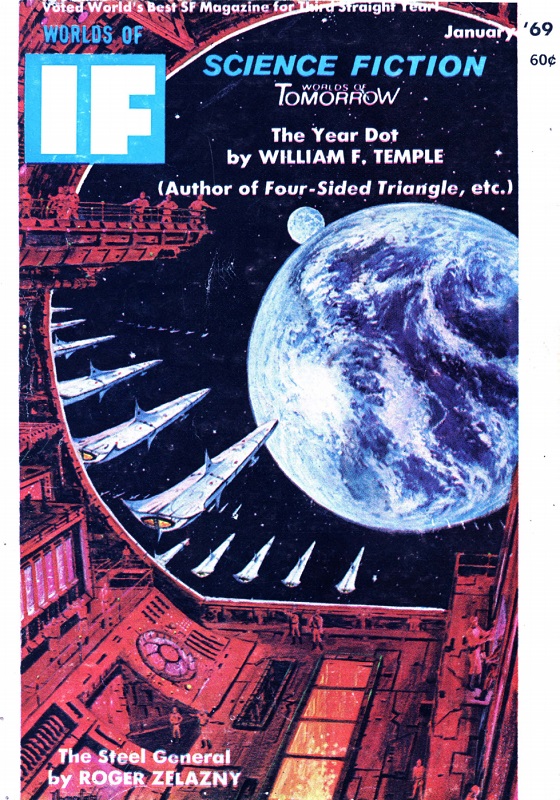 Just some random art not associated with any of the stories. Art by Chaffee
Just some random art not associated with any of the stories. Art by Chaffee![[September 30, 1967] Ain't that good news! (October 1967 <i>Analog</i>)](https://galacticjourney.org/wp-content/uploads/2022/09/670930cover-672x372.jpg)












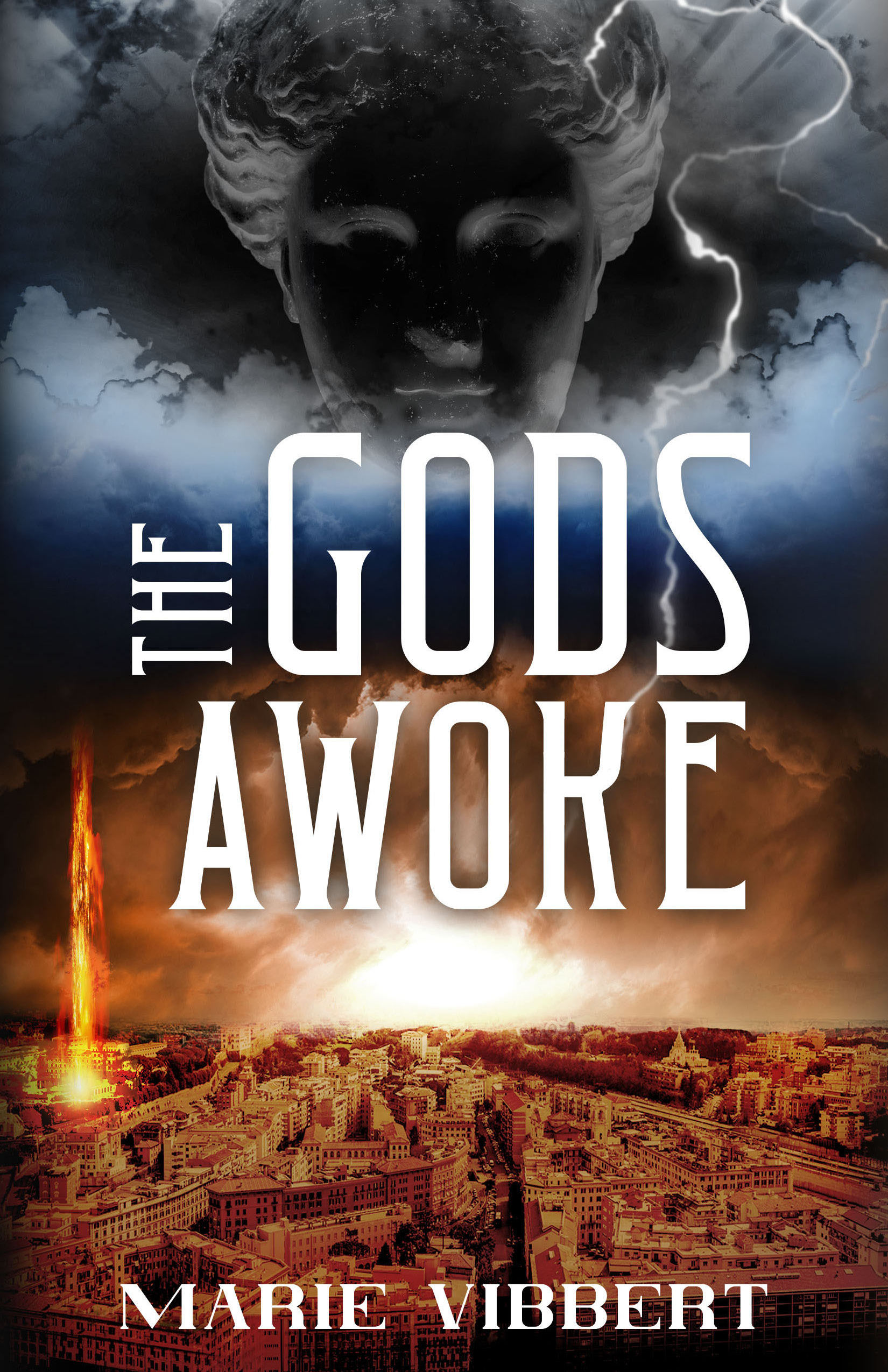
![[August 18, 1967] The Best and the Brightest? (September 1967 <i>Fantasy and Science Fiction</i>)](https://galacticjourney.org/wp-content/uploads/2022/08/670818cover-653x372.jpg)
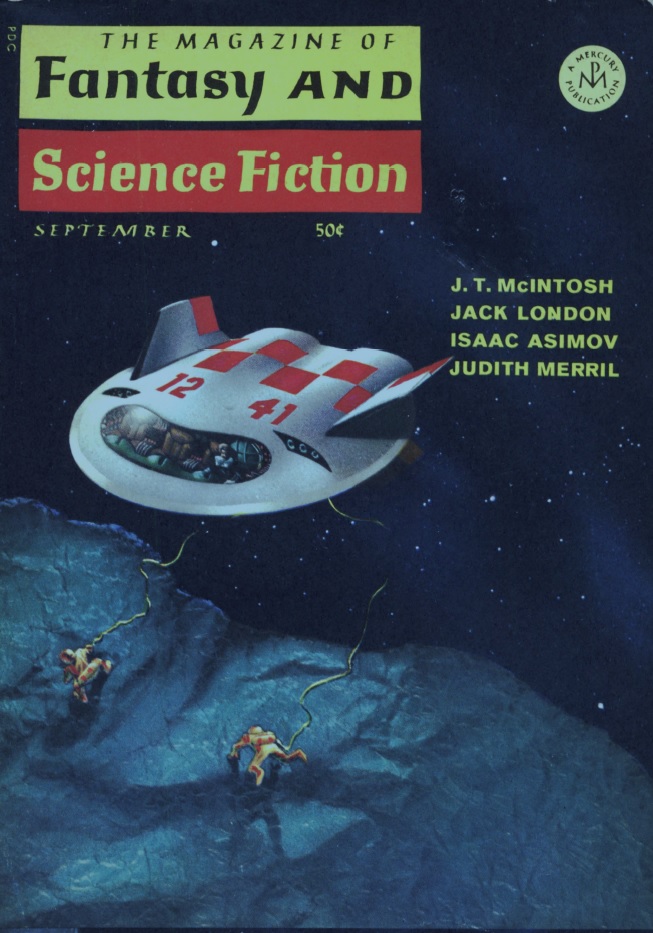
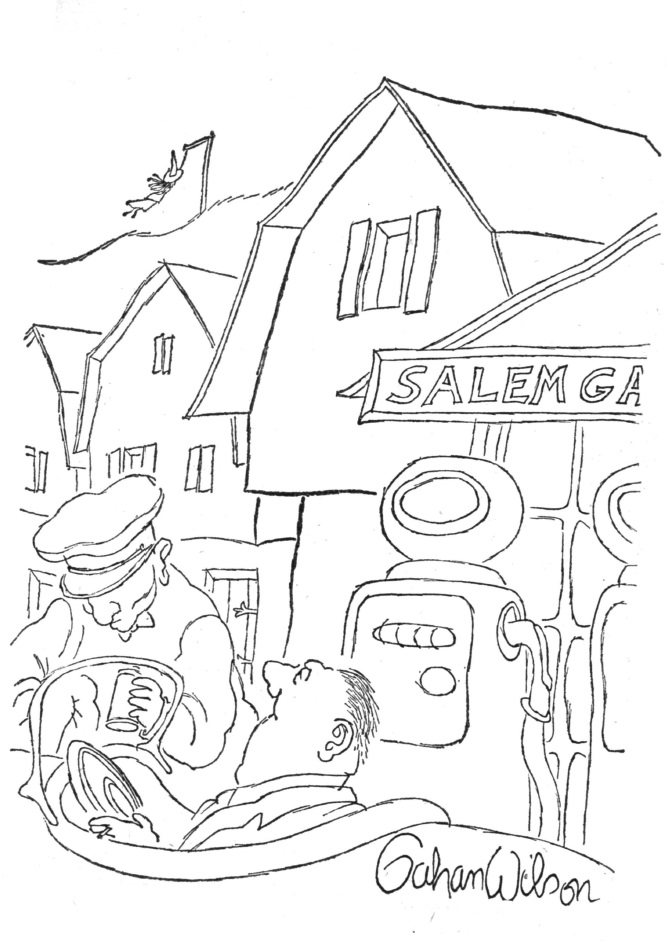

![[December 2, 1966] Mixed Bags (January 1967 <i>IF</i>)](https://galacticjourney.org/wp-content/uploads/2021/11/IF-1966-12-Cover-665x372.jpg)

![[November 6, 1966] Starting Over (December 1966 <i>IF</i>)](https://galacticjourney.org/wp-content/uploads/2021/11/IF-1966-11-Cover-650x372.jpg)
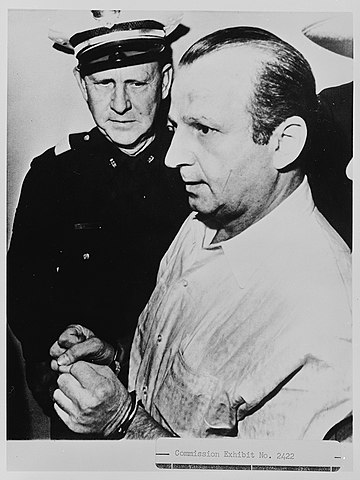

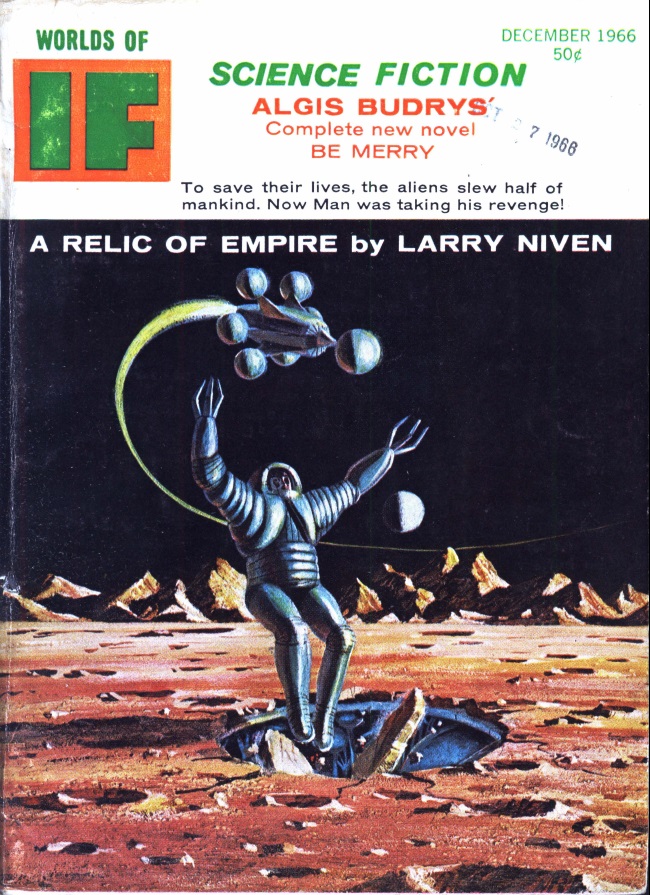
![[October 2, 1966] At Heart (November 1966 <i>IF</i>)](https://galacticjourney.org/wp-content/uploads/2021/09/IF-1966-10-Cover-646x372.jpg)


![[September 14, 1966] All the Old Familiar Places (October 1966 <i>Galaxy</i>)](https://galacticjourney.org/wp-content/uploads/2021/09/660912cover-672x372.jpg)


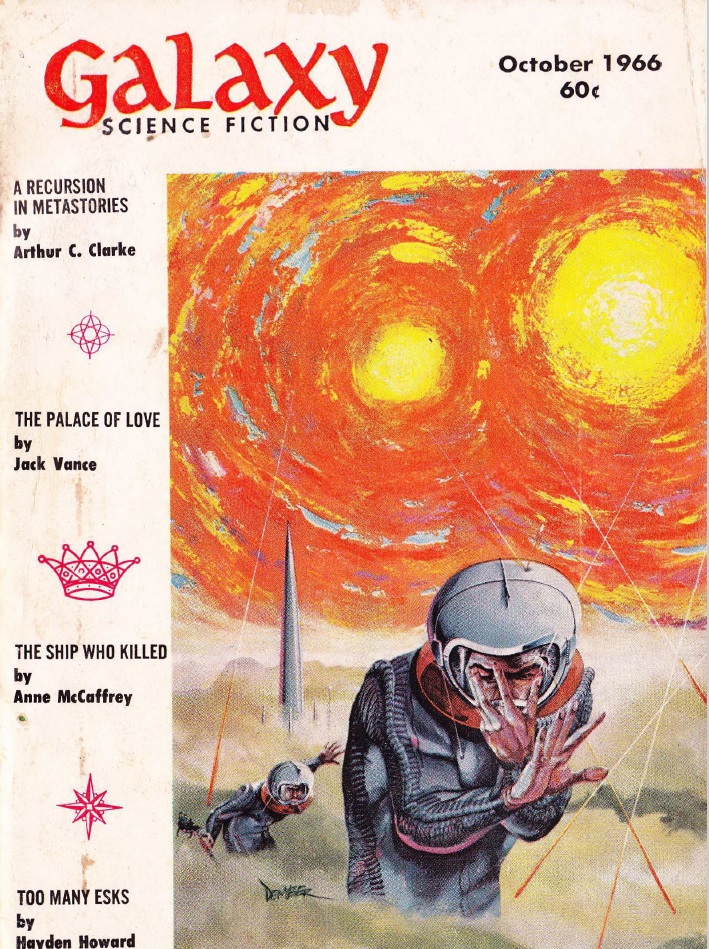
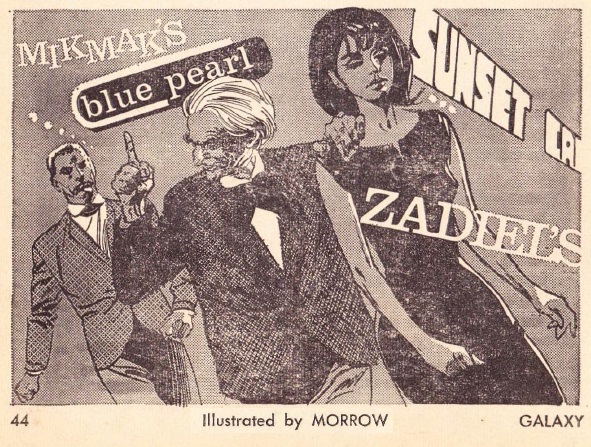
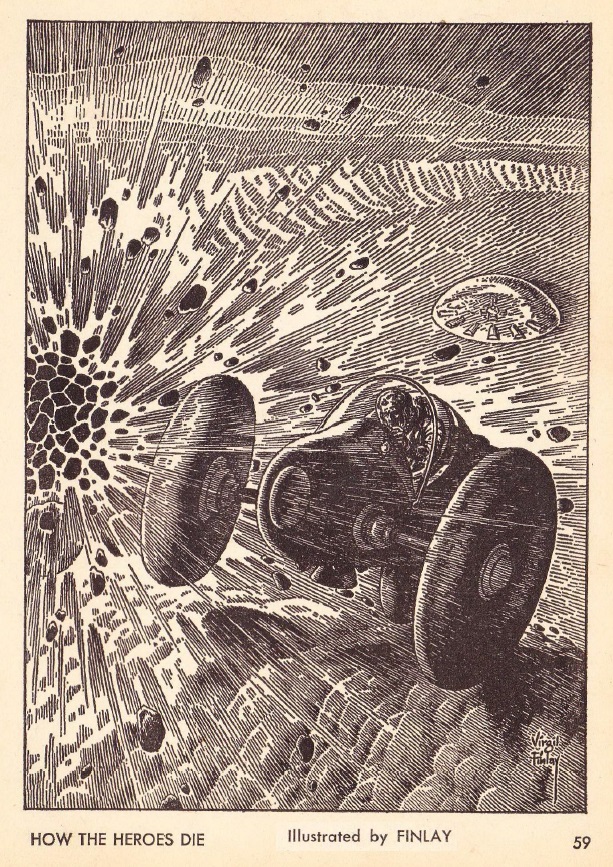
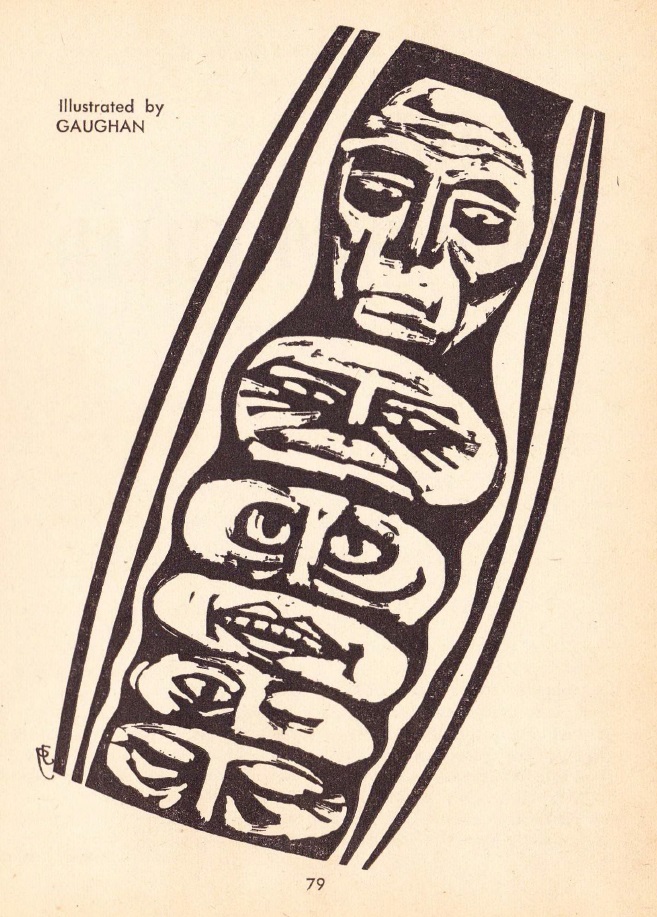
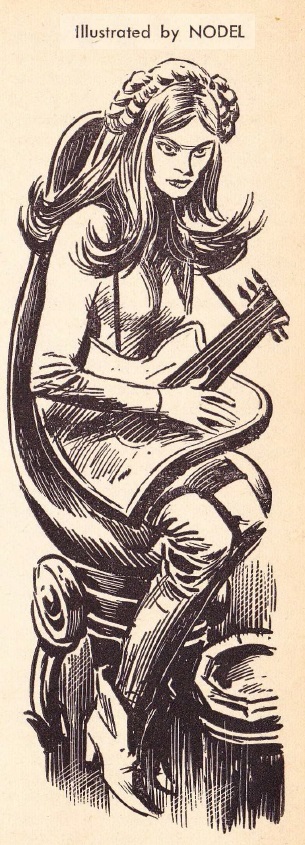
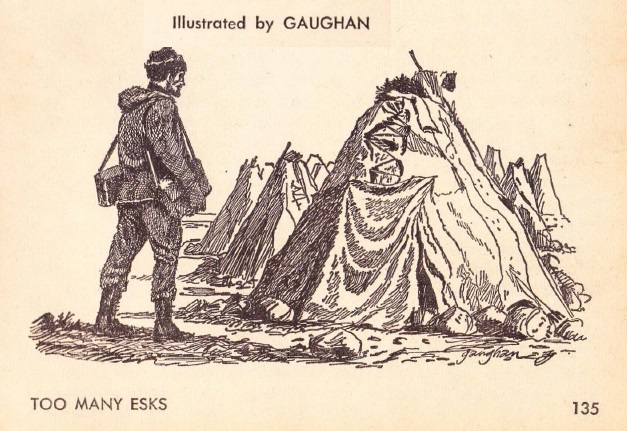
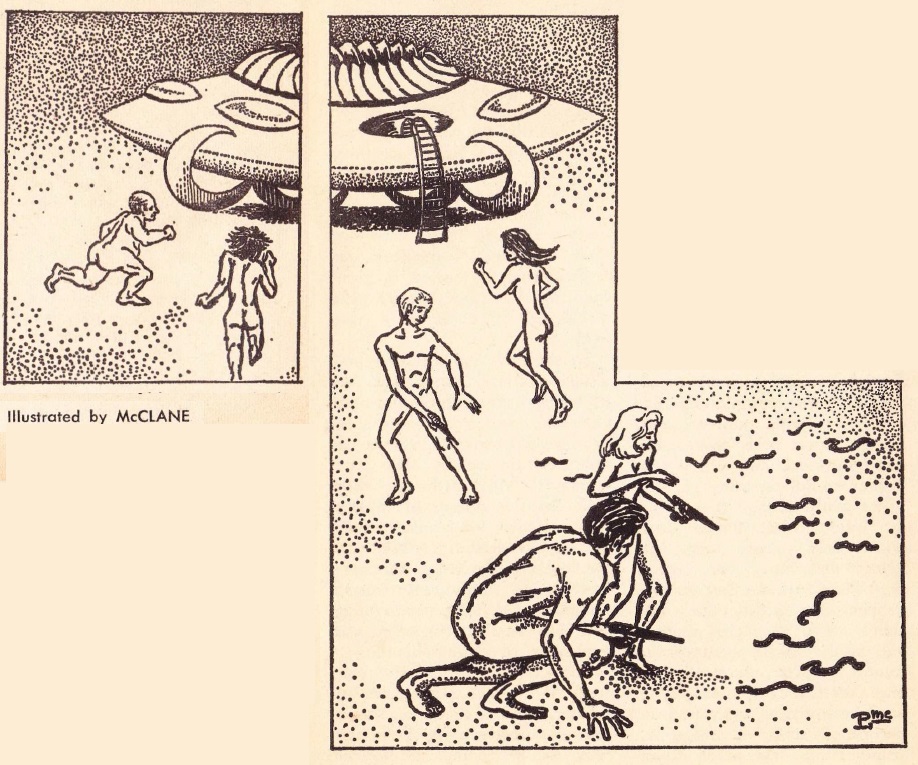

![[September 2, 1966] On the Edge (October 1966 <i>IF</i>)](https://galacticjourney.org/wp-content/uploads/2021/08/IF-1966-10-Cover-662x372.jpg)


